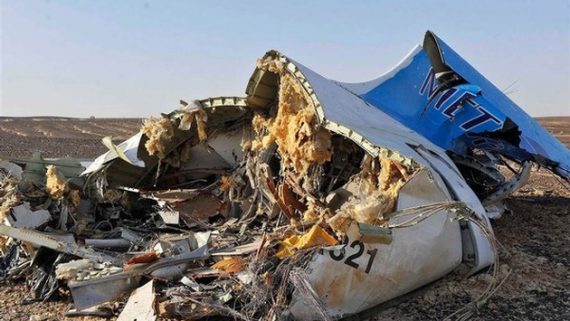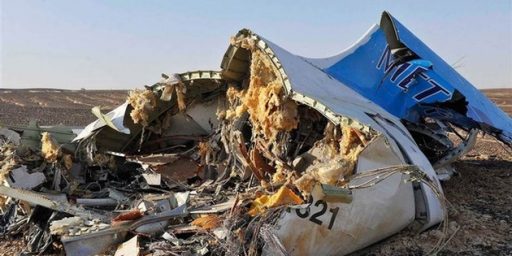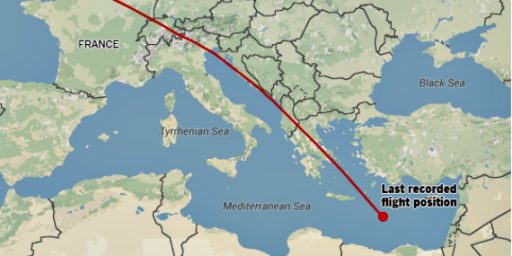U.S. Intelligence: Russian Passenger Jet Likely Brought Down Over Sinai Peninsula By A Bomb
American intelligence officials are saying that a Russian passenger jet that went down over Egypt's Sinai Peninsula was most likely brought down by a bomb.
On Saturday, a chartered Russian Airbus A321-200 with the call sign Metrojet 9268 taking mostly Russian and Ukrainian passengers home from vacations at the Egyptian Red Sea resort of Sharm el-Sheikh went down over the Sinai Peninsula, killing all 224 people on board. In the immediate aftermath of the incident, an ISIS affiliated group based in the Sinai claimed that it had shot down the plane, but that claim was largely dismissed due to the fact that the plane was already at its cruising altitude of 31,000 feet at the time it went down and there is no evidence that any of the Islamist groups that have taken up residence in the desert in the years since the Egyptian Revolution in 2011 had access to the type of weapons that could take out an airliner at that altitude. At most, these groups are believed to have access to shoulder-fired weapons that can at best reach 15,000 to 16,000 feet, and even then only under the most ideal circumstances. Instead, initial speculation centered on possible mechanical trouble on the plane, including the fact that the plane had apparently suffered some kind of damage to its tail section nearly two decades ago. Although that damage had been repaired and the plane deemed flight worthy, some experts stated that undetectable flaws created by such an accident could cause problems even many years later under the right circumstances.
As the days since the incident went on, though, the possibility of something nefarious being involved in the downing of the plane seemed to increase. The plane’s owner issued a stated ruling out mechanical failure that was mostly self-serving, but still taken seriously. Then, this morning, there were reports that American satellites over the area had detected some kind of explosion in the moments before the plane went down, but it could not be determined if the explosion was due to a bomb on the plane, a mechanical failure that led to a fuel tank explosion, or some other factor. Even though the cause of the crash had not yet been determined the United Kingdom and other countries announced today that flights from the airport where the flight had originated would be halted as a precaution. Now, CNN is reporting that U.S. intelligence believes that it was an explosive device planted on the plane at the airport that brought the plane down:
The latest U.S. intelligence suggests that the crash of Metrojet Flight 9268 was most likely caused by a bomb on the plane planted by ISIS or an ISIS affiliate, according to a U.S. official familiar with the matter. The official stressed that there has not been a formal conclusion reached by the U.S. intelligence community. “There is a definite feeling it was an explosive device planted in luggage or somewhere on the plane,” the official told CNN’s Barbara Starr.
The assessment was reached, the official said, by looking back at intelligence reports that had been gathered before Saturday’s plane crash and intelligence gathered since then. The United States did not have credible or verified intelligence of a specific threat prior to the crash, however, the official said, prior to the incident, “there had been additional activity in Sinai that had caught our attention.”
Another U.S. official said the intelligence regarding ISIS is in part based on monitoring of internal messages of the terrorist group. Those messages are separate from public ISIS claims of responsibility, that official said.
NBC News is reporting similar information, albeit in a slightly more qualified manner:
Evidence indicates a bomb brought down Russia’s Metrojet Flight 9268 over the Sinai Peninsula last weekend, and U.S. investigators are focusing on ISIS operatives or sympathizers as the bombers, a U.S. official told NBC News on Wednesday.
Questions have swirled over whether foul play or terrorism may have downed the Metrojet-operated Airbus A321 since it crashed in Egypt on Saturday, killing all 224 people aboard. A group claiming to be affiliated with ISIS took credit for the crash via social media media Wednesday.
The U.S. official said investigators are looking at the possibility that an explosive device was planted aboard the plane by ground crews, baggage handlers or other ground staff at the Sharm el-Sheikh airport before takeoff. U.S. officials had earlier told NBC News that an intelligence scrub of the passenger manifest and the flight crew aboard the jet showed no one with suspected ties to any terrorist group.
Rear Adm. John Kirby, the Pentagon’s senior spokesman, told reporters Wednesday that while investigators were still examining data, but he said, “We need to advise U.S. workers not to go to the Sinai.”
The news tracks with a statement earlier Wednesday by British Prime Minister David Cameron, who said the plane could have been brought down by a bomb. Cameron issued a delay on U.K.-bound flights from Sharm el-Sheikh, saying he wanted U.K. aviation experts to assess security there before travel resumed.
Assuming that all of this proves to be true, and it seems unlikely that intelligence officials would be giving this information to the media if they weren’t quite confident that it is, we are arguably looking at a potential game changer in the world’s confrontation with ISIS specifically and international terrorism in general. Ever since the September 11th attacks, various terrorist groups with ties to al Qaeda and other groups have made efforts to bring down airliners, especially at significant times of the year. Most notably, of course, we have the examples of Richard Reid, who attempted to ignite a crude explosive device contained in his shoes that resulted in new TSA restrictions that continue to this day that require us all to remove footwear when going through airport security. Another attempt came in the person of Umar Farouk Abdulmutallab who apparently had a device of some kind under his clothes. Finally, in late 2010 there were reports that an al Qaeda affiliate in Yemen had perfected a method of shrinking a bomb to the size of a toner cartridge that could be placed among normal commercial packages or in the luggage section of a passenger plane, and that bombs had also been fashioned to look like other common and hard to detect items. None of these plots succeeded, of course, but they all led to further security restrictions and expansion of counter-terror operations.
If confirmed, the news that a Russian jet was brought down by an apparent bomb is likely to change the game significantly. The first question, of course, will be to find out how a bomb could have been gotten on the plane to begin with, although the most likely scenario there would be a security failure at the Sinai airport that the flight originated from. The fact that the Peninsula has been a hotbed of extremist activity for several years now suggests that its possible that airport security could have been infiltrated at some point. If that’s the case, then it wouldn’t have been that difficult for someone on the inside to do something nefarious. Beyond that, the fact that this apparent attack occurred within just over a month after Russia began its campaign in Syria suggests that this may have been some kind of retaliatory move. Whatever the reason, though, the fact that a Russian plane was chosen rather than the several British and other planes that leave from that airport every day is interesting and, possibly intended to send a message. How Russia will react to it assuming that a bomb is indeed confirmed will be very interesting to see.
In any case, it looks like the Sinai Peninsula, which has basically been quiet since the Camp David Accords led to the Israeli withdrawal from the region and the presence of a United Nations peacekeeping force that remains there to this day, may be about to become a focus of the world’s attention.






Welcome to the war on terror, Mr. Putin.
Putin has essentially picked a side in the Sunni vs. Shia funfest in Syria. He and his countrymen are closer to the ME than we are and have a large and restive domestic Muslim population – largely Sunni, I believe. I doubt this will be the end of terrorist attacks against Russian targets.
The man’s a macho genius, I tell you. Ever so manly while riding horses with his shirt off. Every neocons’ favorite foreign dictator. And the upside here for Mr. Putin is what, exactly? A naval base in the Med of just about zero strategic value? Kind of like the base he already had under lease in the Crimea?
In record time Putin has united and energized NATO, incentivized western military expenditures and upgrades, brought a sanctions regime down on the heads of his people, stepped into two quagmires (Ukraine and Syria) and pissed off every Sunni nut with a stick of dynamite to his name.
So much more clever than poor old bumbling Obama who has drastically reduced our vulnerability in Afghanistan and Iraq, killed Osama Bin Laden and much of the rest of the Al Qaeda leadership without losing a man, and flown high above the Syria quagmire in drones and F-16s beyond reach of the multitude of bad guys.
Huh. So maybe ISIS can actually be a danger to say, US airliners and US interests, all the way over there in Syria. But I thought nothing and no one in Syria could possibly strike at US interests. Why it’s almost like they are similar to al Qaeda-another jihadi group that can strike at long distance. And so another down goes another argument that the US has no reason to intervene in Syria
@michael reynolds:
Well, to be honest, Russia has been at war with Sunni jihadists for a long time, ever since the Chechen wars in the 1990s. Some of the most horrific Islamic terror attacks have occurred in Russia, including the Beslan school siege, where 300 people were killed, the majority of them children.
What’s clear is that ISIS is serving notice that Putin’s adventure in Syria will not be a free ride for Russia. OTOH, as you once put it, you can’t out suffer the Russians, and they’re good at taking revenge, too. There won’t be any “surgical” responses. Expect a lot more blood spilled. On both sides.
This is the main reason why I’m somewhat skeptical.
It would be awfully convenient, for us, if that were true. The contradictory and confusing stuff revolving around this story makes me think we’re witnessing some kind of manufactured international incident.
Need more info.
I remember reading in one article that certain Egyptian security agents have been known to take bribes to let stuff through the screening process uninspected.
I suspect that’s the easiest way that something could have been slipped on to the plane here.
@grumpy realist:
Or a cleaner or mechanic or other maintenance person.
gee, i wonder if russia will complain to the un or something? i say they drop 100/1 shhetheads to russians. who wants odds on that?
@stonetools:
Putin is often suspected as the culprit of 1999 bombings in Moscow. If the Russian security forces were in fact behind those then they surely could have done this.
@Modulo Myself: That for me goes into tinfoil hat territory. I just go by “cui bono?” and yeah, ISIS or one of the other terrorist groups is out there first.
@stonetools:
Yeah, but Chechnya’s relatively calm nowadays. Putin’s bombing Al Qaeda related groups and ISIS.
Really dumb. He should have joined the call to remove Assad and stick some random general in there with a bunch of bogus promises about elections. (He may still come around to that, the Kremlin’s been signaling a lack of 100% devotion to the person of Assad.) A picked boy who was at least arguably acceptable to us and the Turks would have continued to defend the Orthodox and the Alawites and Putin could have kept his naval base and listening posts.
If he helped knock off Assad he’d have won props from the Turks who are surely more useful to Russia in the long run than the Assad family, or even Iran. They do control the Bosporous through which Mr. Putins boats must go if they want to see Syria and the Mediterranean. I mean, it’s nice of Putin to remind Turkey why they’re in NATO and have to get along with the Americans, but I’m not seeing how that benefits Russia.
I feel very sorry for any loss of innocent life to terrorism.
This may have been the result of a bomb but it is perhaps we we should look at the shelf life of airliners. Multiple compressions and decompressions impact the structural integrity. This particular plane had also been involved in an incident several years ago.
@Ron Beasleyly: That’s why they’re looking at the bits. An explosion will leave different marks that a decompression.
Being directly familiar with Egypt and the airport in question, wild speculation about bomb advancement is grossly premature. Corruption and/or ‘turning’ of a cleared airport person is rather more likely.
This doesn’t really say grand things about DAESH or Russia as such, it is more a Sinai issue – the population of the Sinai has long rather hated the Egyptian state and are in many ways ethnically distinct from the Valley Egyptians. Always have been.
In any case, “Assuming that all of this proves to be true, and it seems unlikely that intelligence officials would be giving this information to the media if they weren’t quite confident that it is” is a rather optimistic bit of thinking given the quality of American intel statements in general about the region.
It might yet prove the case, and given the specific situation in the Sinai, is certainly not to be excluded, but neither is (particularly given Russian regional airlines maintenance habits and history) an equipment failure.
@Lounsbury:
I’m more familiar with Hurghada than Sharm but this seems more likely to me as well.
@michael reynolds:
What do you mean welcome? Russia has been locked in a struggle with Islamists since the 1980s (in large part initiated by Russia’s invasions of Afghanistan and Chechnya). There have been multiple large-scale terrorist attacks inside Russia by Islamists, including the notorious Beslan school massacre.
@stonetools:
Sure you can. The Afghans did it.
If it can be proven that ISIS had anything to do with this, then that changes things completely. More nations will get involved and set policies and strategies to stop and put and end to this terrorist group.
ISIS has made some claims of responsibility for this, but ISIS usually makes videos of their crimes.
ewww
any retractions?
It has clear massaging gel and it works
very well with open toe shoes. At this time, their body temperature drops
and their heart rate can decrease from 200 beats per
minute (bpm) to 10 bpm. My mother and my grandmother are
very calm people who seem to handle stress very well.